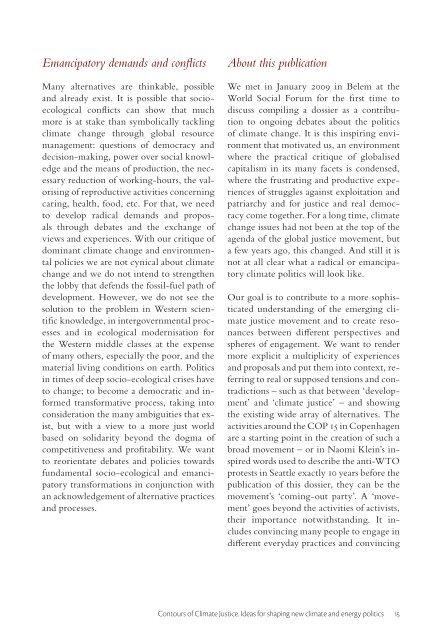Contours of Climate Justice - Dag Hammarskjöld Foundation
Contours of Climate Justice - Dag Hammarskjöld Foundation
Contours of Climate Justice - Dag Hammarskjöld Foundation
Create successful ePaper yourself
Turn your PDF publications into a flip-book with our unique Google optimized e-Paper software.
Emancipatory demands and confl icts<br />
Many alternatives are thinkable, possible<br />
and already exist. It is possible that socioecological<br />
confl icts can show that much<br />
more is at stake than symbolically tackling<br />
climate change through global resource<br />
management: questions <strong>of</strong> democracy and<br />
decision-making, power over social knowledge<br />
and the means <strong>of</strong> production, the necessary<br />
reduction <strong>of</strong> working-hours, the valorising<br />
<strong>of</strong> reproductive activities concerning<br />
caring, health, food, etc. For that, we need<br />
to develop radical demands and proposals<br />
through debates and the exchange <strong>of</strong><br />
views and experiences. With our critique <strong>of</strong><br />
dominant climate change and environmental<br />
policies we are not cynical about climate<br />
change and we do not intend to strengthen<br />
the lobby that defends the fossil-fuel path <strong>of</strong><br />
development. However, we do not see the<br />
solution to the problem in Western scientifi<br />
c knowledge, in intergovernmental processes<br />
and in ecological modernisation for<br />
the Western middle classes at the expense<br />
<strong>of</strong> many others, especially the poor, and the<br />
material living conditions on earth. Politics<br />
in times <strong>of</strong> deep socio-ecological crises have<br />
to change; to become a democratic and informed<br />
transformative process, taking into<br />
consideration the many ambiguities that exist,<br />
but with a view to a more just world<br />
based on solidarity beyond the dogma <strong>of</strong><br />
competitiveness and pr<strong>of</strong>i tability. We want<br />
to reorientate debates and policies towards<br />
fundamental socio-ecological and emancipatory<br />
transformations in conjunction with<br />
an acknowledgement <strong>of</strong> alternative practices<br />
and processes.<br />
About this publication<br />
We met in January 2009 in Belem at the<br />
World Social Forum for the fi rst time to<br />
discuss compiling a dossier as a contribution<br />
to ongoing debates about the politics<br />
<strong>of</strong> climate change. It is this inspiring environment<br />
that motivated us, an environment<br />
where the practical critique <strong>of</strong> globalised<br />
capitalism in its many facets is condensed,<br />
where the frustrating and productive experiences<br />
<strong>of</strong> struggles against exploitation and<br />
patriarchy and for justice and real democracy<br />
come together. For a long time, climate<br />
change issues had not been at the top <strong>of</strong> the<br />
agenda <strong>of</strong> the global justice movement, but<br />
a few years ago, this changed. And still it is<br />
not at all clear what a radical or emancipatory<br />
climate politics will look like.<br />
Our goal is to contribute to a more sophisticated<br />
understanding <strong>of</strong> the emerging climate<br />
justice movement and to create resonances<br />
between diff erent perspectives and<br />
spheres <strong>of</strong> engagement. We want to render<br />
more explicit a multiplicity <strong>of</strong> experiences<br />
and proposals and put them into context, referring<br />
to real or supposed tensions and contradictions<br />
– such as that between ‘development’<br />
and ‘climate justice’ – and showing<br />
the existing wide array <strong>of</strong> alternatives. The<br />
activities around the COP 15 in Copenhagen<br />
are a starting point in the creation <strong>of</strong> such a<br />
broad movement – or in Naomi Klein’s inspired<br />
words used to describe the anti-WTO<br />
protests in Seattle exactly 10 years before the<br />
publication <strong>of</strong> this dossier, they can be the<br />
movement’s ‘coming-out party’. A ‘movement’<br />
goes beyond the activities <strong>of</strong> activists,<br />
their importance notwithstanding. It includes<br />
convincing many people to engage in<br />
diff erent everyday practices and convincing<br />
<strong>Contours</strong> <strong>of</strong> <strong>Climate</strong> <strong>Justice</strong>. Ideas for shaping new climate and energy politics 15
















